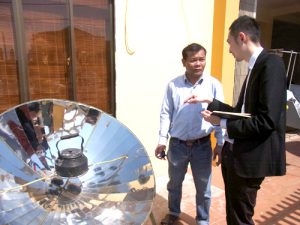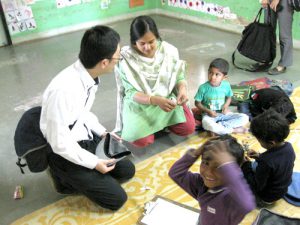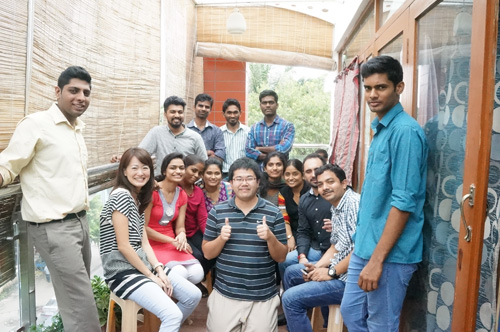in Vietnam
Panasonic × Solar Serve (Vietnam, Social Enterprise)
 | × | 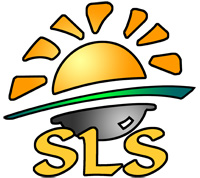 |
Panasonic Corporation, a consumer electronics giant in Japan, launched our Corporate Volunteering Program (CVP) under the name, “Panasonic Innovation Volunteer Team” in 2012. The program intends both to contribute to the improvement of livelihood for local communities in need and, to learn about local culture, their lifestyles and various social issues they face. Since its launch, the company has dispatched over 10 of their employees to contribute to NGOs and social enterprises.
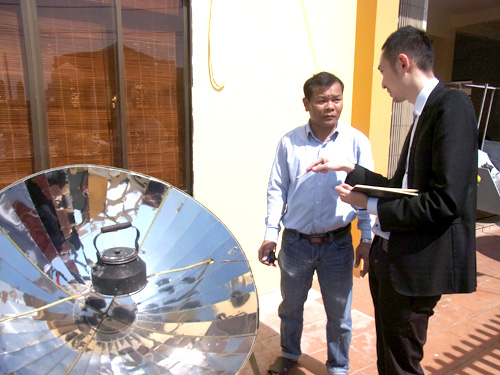 In Vietnam, there are still people with low-income who do not have access to or cannot afford to use gas or electricity on a daily basis, instead resorting to firewood for cooking. Not only are rampant firewood use and its smoke harmful to human health, they also contribute to the loss of trees that host biodiversity spots and store carbon dioxide, accelerating climate change. In order to improve such situation, Solar Serve, a social enterprise began in 2009 to produce and sell solar cookers, device that uses solar energy for cooking. However, the organization faced the challenge of limited adoption of the product due to its high price, $100 per unit. If made at a lower cost, the organization could distribute more units at much affordable prices for low-income families.
In Vietnam, there are still people with low-income who do not have access to or cannot afford to use gas or electricity on a daily basis, instead resorting to firewood for cooking. Not only are rampant firewood use and its smoke harmful to human health, they also contribute to the loss of trees that host biodiversity spots and store carbon dioxide, accelerating climate change. In order to improve such situation, Solar Serve, a social enterprise began in 2009 to produce and sell solar cookers, device that uses solar energy for cooking. However, the organization faced the challenge of limited adoption of the product due to its high price, $100 per unit. If made at a lower cost, the organization could distribute more units at much affordable prices for low-income families. Identifying the organization’s need to improve the product design in order to reach more people, and wishing to contribute to organizations that are working to address social issues, Panasonic delegated Mr. Naoaki Yamamoto in March 2012 as the company’s first volunteer to join Solar Serve for one month. His mission was to design a low-cost model of solar cookers and to make a prototype. To support Mr. Yamamoto, Panasonic called in a number of employees with different and relevant expertise and created a remote team. A remote team functions as a supporting body that contributes their professional skills to the work of the volunteer remotely from Japan.
 In order to understand the reality of the situation, Mr. Yamamoto first held discussions with the organization’s staff members, interviewed the solar cooker users, and carefully observed the production processes. He then discovered that among the components of the solar cooker, the device for collecting solar rays had room for cost cuts in the production. He had constant discussions with the remote team back in Japan via Skype and SNS tool, who contributed all their skills and knowledge, but they eventually hit a wall. It is at this point that the remote team turned to the veteran engineers of Panasonic, who had more experience and knowledge in the field, for assistance. Although the veterans were first puzzled with this sudden request, they were impressed by the team’s passion and became interested in contributing to the Vietnamese society using the technology of the company. Thus, they agreed to provide advice to the team.
In order to understand the reality of the situation, Mr. Yamamoto first held discussions with the organization’s staff members, interviewed the solar cooker users, and carefully observed the production processes. He then discovered that among the components of the solar cooker, the device for collecting solar rays had room for cost cuts in the production. He had constant discussions with the remote team back in Japan via Skype and SNS tool, who contributed all their skills and knowledge, but they eventually hit a wall. It is at this point that the remote team turned to the veteran engineers of Panasonic, who had more experience and knowledge in the field, for assistance. Although the veterans were first puzzled with this sudden request, they were impressed by the team’s passion and became interested in contributing to the Vietnamese society using the technology of the company. Thus, they agreed to provide advice to the team.Now, with the support of the four experts in the remote team and valuable advice from the veteran engineers on technical matters, Mr. Yamamoto reviewed the structural design and managed to reduce the number of parts of solar cookers and overall welding time. In the last week at the organization, the staff members and Mr. Yamamoto designed and developed a prototype of low-cost model. Based on Mr. Yamamoto’s analysis, the new prototype would result in 16% reduction of the production cost. Further developments were needed, but this prototype served as an initial model with which the organization could make improvements on to commercialize in the future. On the final day, Mr. Yamamoto cooked Japanese food for the staff members using the newly developed solar cooker.
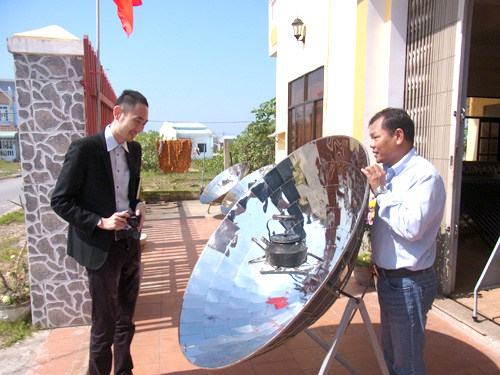 The prototype was a result of tireless work of not only Mr. Yamamoto, but also other Panasonic members across various departments and positions, and of the trust established between Panasonic team and the partner organization. Mr. Bich Tan Nguyen, the founder and CEO of the organization said, “There have been various supports from the outside, such as financial assistance and publicizing through media, for which we were surely grateful. However, what is the most important for us is to have someone who actually works together with us. I very much appreciate that Mr. Yamamoto worked very hard and diligently alongside us.”
The prototype was a result of tireless work of not only Mr. Yamamoto, but also other Panasonic members across various departments and positions, and of the trust established between Panasonic team and the partner organization. Mr. Bich Tan Nguyen, the founder and CEO of the organization said, “There have been various supports from the outside, such as financial assistance and publicizing through media, for which we were surely grateful. However, what is the most important for us is to have someone who actually works together with us. I very much appreciate that Mr. Yamamoto worked very hard and diligently alongside us.”Mr. Yamamoto also gained new insights through the program. First is the importance to see things in the same way that local people do. Mr. Yamamoto says, “When starting a business, we need to think of those who need the products. We need to try to see in the way they do, become friends with them, and to imagine their problems and backgrounds.” The second is the experience of achieving his mission on his own as an individual. He had been on many overseas business trips, but never had he worked without the company’s representation to establish a relationship with the locals and plan all the activities to achieve the mission on his own. With pressure and difficulties came the true sense of accomplishment. In addition, many of Panasonic employees got involved in this program through the remote team and the advisory team of veteran engineers. They said that this program provided an interaction within the company between those whom they would not have had a chance to know with their usual work.
What Mr. Yamamoto experienced in Vietnam almost resembled what Panasonic had undergone at the early years of its history, manufacturing with limited resources for the people in need and for the betterment of the society. The program also served as an opportunity for Panasonic employees to re-discovery the significance of their company to exist in the society, as well as the meaning of the employees to work in the company with a common mission.
